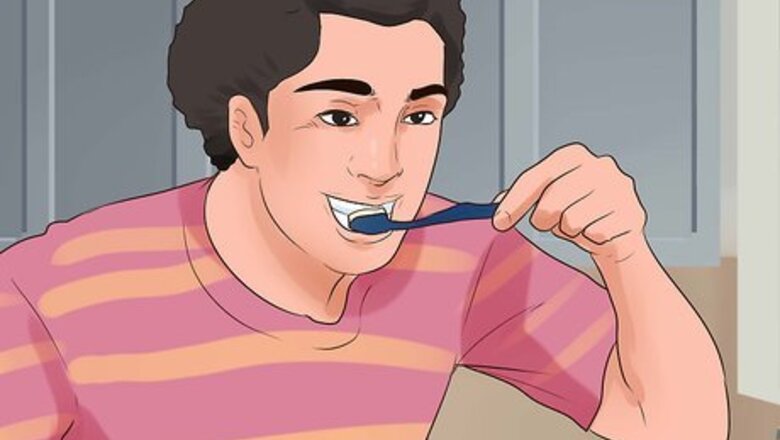
views
Adjusting Your Oral Hygiene
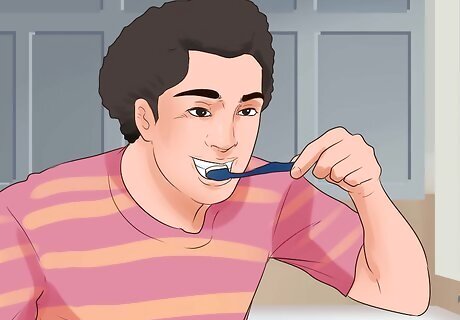
Brush your teeth regularly. Two major sources of mouth odor are bacteria and decaying food particles. There are hundreds of nooks and crannies in the fertile landscape of your mouth where these offending bits of "rot" can get lodged. Squeeze a pea-sized amount of toothpaste onto a soft bristled toothbrush and hold the brush at a 45-degree angle to the gums. Brush your teeth on every surface in short, gentle strokes, being careful not to press too hard or irritate the gums. If done properly, brushing should take about three minutes. Brush your teeth and rinse with mouth wash at least twice a day, and floss at least once a day. Take care to brush all the areas of your mouth, including gums and tongue, and not just your teeth.
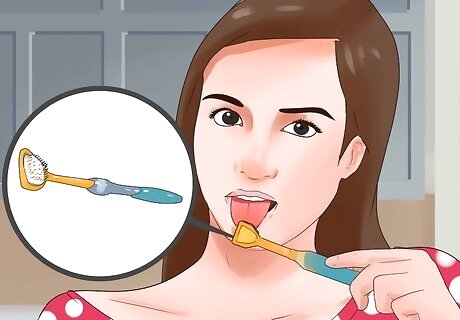
Clean your tongue. It is not enough to simply brush your teeth. Since your tongue has a lot of surface area and is covered with textured bumps and grooves, it harbors more bacteria than the rest of your mouth combined. Removing the bacteria on your tongue can go a long way in reducing your bad breath. Brush your tongue from back to front, rinsing the brush between strokes. By brushing your tongue, you're removing bacteria that can contribute to a bad taste or odor in your mouth, as well as tooth decay and gum disease. If you have a sensitive gag reflex, tongue-brushing may aggravate the problem.
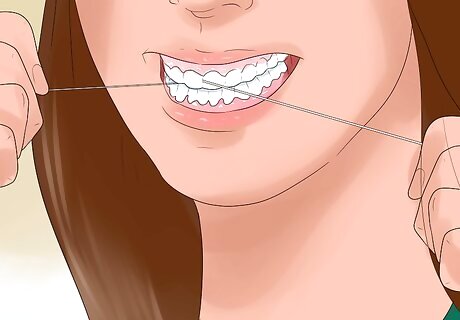
Floss every day. Flossing your teeth is just as important to good oral health as brushing, and even more important for reducing bad breath. Make it as much of a mindless habit as brushing your teeth. At first, your gums might bleed as you dislodge chunks of food that have "stuck" to your teeth and gum for who knows how long. But take a second to smell the floss after you pass it through your teeth, if you dare. You'll see (or smell) where the bad breath is coming from.
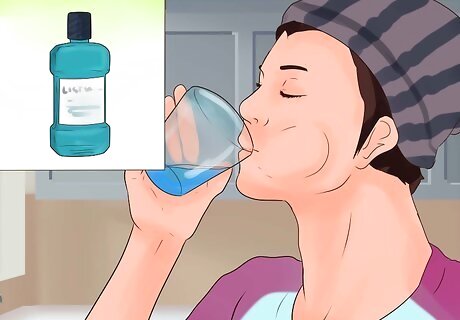
Use mouthwash. Mouthwash helps to keep your mouth moist and helps to prevent bad breath. Choose a mouth wash containing chlorine dioxide. Many of the bacteria that cause halitosis live on the back of the tongue, too far back to remove with regular brushing or scraping. Luckily, vigorous swishing with a chlorine dioxide-containing wash can neutralize those bacteria. Try rinsing with mouth wash before brushing, flossing, and brushing or scraping the tongue, and again when you're done. This will ensure that you neutralize any bacteria that remain after the process is complete.
Changing Your Habits
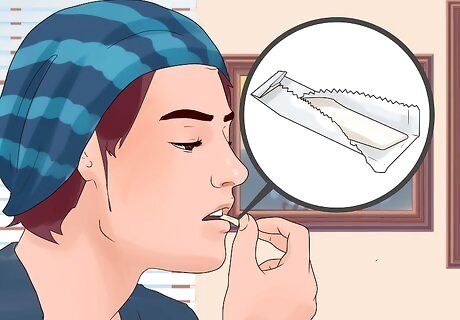
Consider chewing gum. Any gum will help with bad breath because the chewing action results in more saliva being produced. Some gums, however, have better bad-breath-fighting abilities than others: Cinnamon flavoring seems to be especially effective in reducing bacteria counts in your mouth. Look for gum sweetened with xylitol (sugar only feeds the bacteria, causing more odor problems). Xylitol is a sugar substitute that actually works to prevent bacteria from replicating in the mouth.
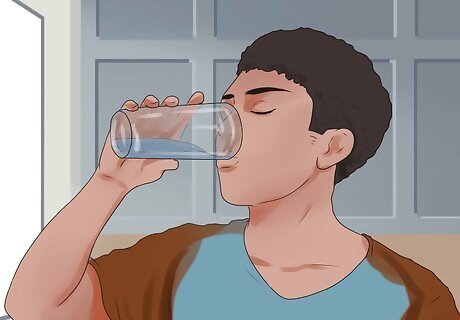
Keep your mouth moisturized. A dry mouth is a stinky mouth. That's why your breath is worse in the morning; your mouth produces less saliva as you sleep. Saliva is the enemy of bad breath because not only does it physically wash bacteria and food particles away, but it also has antiseptic and enzymes that kill bacteria. Chewing gum stimulates saliva production (in addition to covering up the odor with some kind of scent). Mints do not encourage saliva production. Drink water. Swish the water between your teeth from side to side. Water won't necessarily increase saliva production, but it'll wash out your mouth — and it is good for you. Dry mouth can be caused by certain medications and medical conditions. Ask your doctor about switching medications, or addressing the underlying condition.
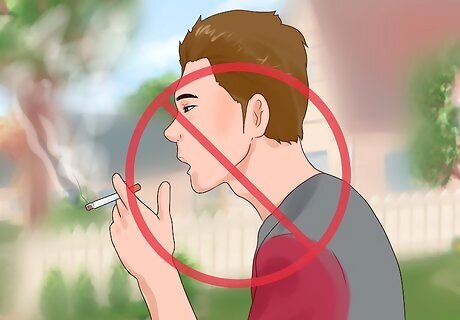
Stop smoking and chewing tobacco products. In case you needed yet another reason to stop this dangerous habit, tobacco is notorious for causing bad breath. Tobacco addiction can be a hard habit to break, so visit this helpful wikiHow page for tips and advice. In some cases, bad breath can be an early sign of oral cancer caused by smoking or chewing tobacco. You must stop smoking and see your doctor to be evaluated for this very serious condition. Smoking tobacco will also leave unattractive yellow stains on your teeth.
Changing Your Diet
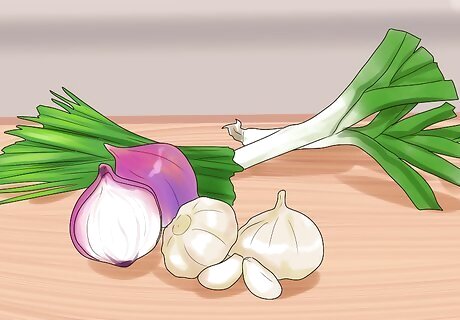
Eliminate odorous foods. Our bodies absorb the flavors and odors of the foods we eat, so particularly odorous cuisine can linger in your breath for hours after eating. Consider eliminating these foods from your diet, or at the least be sure to brush after eating. Vegetables in the Allium family, like onion, garlic, leeks, and chives, have a notorious pungent aroma. Eating these foods and foods prepared with them like hummus or curry can leave your breath particularly aromatic. However, these foods also have many health benefits, so rather than eliminating them, try to limit them to times when you will be alone afterwards, like dinners at home. Recognize that even brushing won't be enough to really eliminate raw garlic smells and other pungent aromas. In fact, your body digests these foods, and the odor goes into the bloodstream and lungs and comes back out again as bad breath! If you eat a diet that is very high in these foods, reducing them (without completely eliminating them) may go a long way in improving your breath.

Eliminate or reduce coffee and alcohol. The chemical compounds in these beverages alter the environment of your mouth, making it favorable for odor-causing bacteria to thrive. If you can't or don't want to quit drinking these beverages, be sure that after drinking them you rinse your mouth well with water or a mix of one part baking soda to eight parts water, and then brush your teeth well about 30 minutes later. Avoid brushing directly after drinking coffee or alcohol (or other acidic foods or drinks), as the acid in the drink can make your teeth vulnerable to abrasion from brushing.

Eat some carbs. Did you know that if you're on a low-carb diet, you might have "ketone breath"? Basically, as your body breaks down fats instead of carbs for energy, it creates ketones, some of which are released in your mouth. Unfortunately, ketones smell bad, and so will your breath. If you're on a strict carb-restricting diet, or any diet that forces you to burn fat instead of carbs, consider throwing healthy carb-rich snacks into the mix, like apples or bananas. In addition, fruits with high vitamin C content will help you fight potentially harmful bacteria, which can be a cause of bad breath. This will also happen to anyone who fasts, whether for religious reasons or because they are anorexic. If you are anorexic, bad breath is only one of the reasons to stop starving yourself.
Knowing When to Seek Medical Advice

Talk to a doctor. If you've followed the above steps diligently and the bad breath persists, you may have a medical issue that needs to be treated. Bad breath is a sign that something is not right in your body. If altering your hygiene practices and your diet does not improve your symptoms of bad breath, there is a good chance that there is some other imbalance, infection, or disease in your body that is causing it.
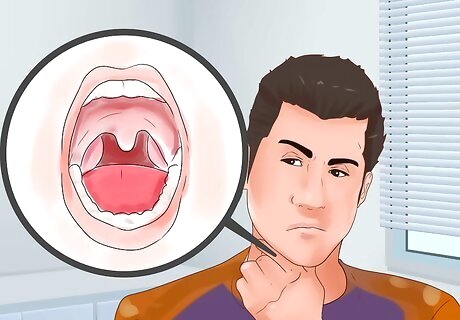
Look for tonsil stones. These are lumps of calcified food, mucus, and bacteria that collect in the tonsils and can be seen as white spots. They are often mistaken for a throat infection such as strep throat, although sometimes they are too small to be visible in a mirror. Tonsil stones are often harmless but cause a reeking bad breath. If you see a small white patch on the tonsil, try swabbing it gently with a cotton swab (be careful not to gag yourself, and don't press too hard). If it comes off on the swab and is a liquid or pus, you likely have a tonsil infection; however, if it doesn't come off or if it comes out as a solid chunk of white matter, it is likely a stone. Smell it and you'll know for sure. You might also notice a metallic taste in your mouth or an obstructed feeling when swallowing.
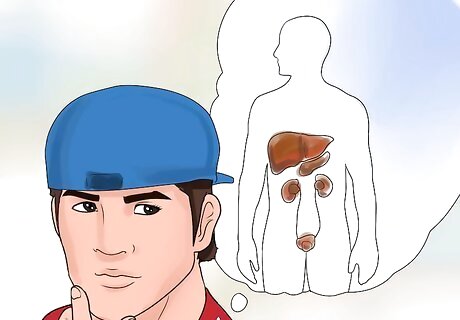
Consider whether you have diabetic ketoacidosis. If you have type 2 diabetes, it may be causing your body to burn fat instead of glucose, which releases ketones, a chemical that results in bad breath. Bad breath can be caused by metformin, a type 2 diabetes medication. If you take metformin, talk to your doctor about alternate treatment options.

Consider other potential culprits. There are a vast array of illnesses that can cause halitosis, including the following: Trimethylaminuria. If your body can't break down a chemical called trimethylamine, it will be released in your saliva, causing bad breath. It'll also be released in your sweat, so persistent body odor might be an accompanying symptom. Infection: Several types of infections such as sinusitis and infections of the stomach can result in bad breath. It is important to have any unusual symptoms checked out by your doctor, including this one. Kidney disease or failure: In particular, a metallic or ammonia taste and scent to the breath can indicate severe problems with the kidneys. See your doctor if you have this symptom.


















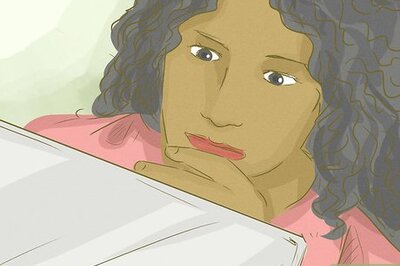
Comments
0 comment